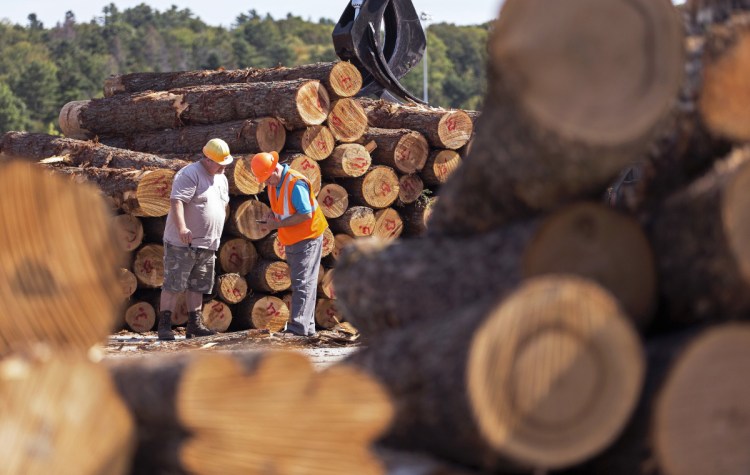AUGUSTA — Gov. Paul LePage told lawmakers he opposes a pair of bills that would have taxpayers fund a $45 million subsidy to help Maine’s foundering biomass industry.
In a rare appearance before the Legislature’s budget-writing Appropriations Committee, LePage said the Legislature should focus instead on ways of creating industries that bring greater value from the state’s more than 18 million acres of forest lands.
The bills to support investments and a low-interest revolving loan fund come less than two years after the Legislature passed a $13.4 million taxpayer-funded bailout of the industry that LePage reluctantly supported at the time.
“They took the state subsidy for two years and now at the end of two years if you don’t give them a subsidy they are going to close,” LePage said of the previous bailout that largely went to help one company and the loggers who supplied it. “I call that corporate welfare at the worst, it can’t get any worse than that because they are coming in and they are telling you up front the only way they can survive is by you giving them a subsidy.”
LePage urged lawmakers to instead consider a bonding proposal he has offered in the past that would pump $50 million toward developing new products from Maine’s forests. He gave the example of a hardwood plywood mill that could then manufacture rifle and pistol stocks for gun makers who currently import their plywood from Russia.
The governor said that during his private career helping to save struggling businesses, he was twice involved with biomass projects. “Let’s not keep going back doing the same thing we done and know we are going to lose money,” he said.
One of the bills proposed Wednesday, sponsored by Sen. Troy Jackson, D-Allagash, would create a $20 million revolving loan fund for capital investments in biomass plants, which burn wood to generate power for the electric grid. The second bill, sponsored by Sen. David Woodsome, R-North Waterboro, would provide $25 million to extend steam piping from existing biomass plants to nearby manufacturing facilities, build co-generation plants that produce electricity and heat for sawmills, and convert fossil-fuel boilers in public buildings and businesses to biomass boilers.
The sponsors of the two bills agreed Wednesday to merge the measures into a single bill with a $25 million price tag. LePage, however, said he still opposed that measure.
Jackson emphasized the value of the renewable resources in Maine’s forests in written testimony to the committee.
“By capitalizing on biomass energy, we have the ability to be a world leader in this industry,” he said. “The potential for developing new markets, innovating the industry, growing the economy and creating jobs is too great to pass up.”
Jackson added that the Biomass Power Association estimates the six stand-alone biomass plants in Maine, when they are operating, spend about $115 million a year and support 148 direct jobs and 900 indirect jobs in Maine.
Supporters emphasized those jobs when they convinced the Legislature to approve a bailout in 2016 for biomass company ReEnergy Holdings LLC. But lawmakers who opposed the move warned then that the bailout wouldn’t work and predicted that another round of funding would be requested.
“I’m not against the industry or the people who work in it,” state Sen. Garrett Mason, R-Lisbon, said at the time. “It’s because I don’t believe it will help.”
The current biomass bills are among 22 proposals for bond issues totaling more than $520 million in borrowing. The requests cover everything from subsidizing biomass to mapping the state’s near-coastal ocean floor to funding improvements for Maine Public’s broadcasting network, which also serves as the state’s emergency broadcast system.
Most of the borrowing proposals are likely to be rejected because the state’s borrowing capacity is capped at about $150 million each year, according to lawmakers on the committee. They said they expect the Legislature’s Transportation Committee also will be looking to again borrow as much as $100 million for road and bridge construction.
In a letter to the committee, Alec Porteous, the commissioner of the Department of Administration and Financial Services, said the state currently carries nearly $1.2 billion in taxpayer-supported debt. He warned that interest rates were likely to increase despite the state’s fiscal house being order, which he attributed to LePage’s financial management.
“With that in mind, Gov. LePage would support, in principle, bonds and overall state borrowing that strengthen Maine’s infrastructure and support economic growth; and a bond package that does not yield a significant increase in total debt supported by Maine taxpayers,” Porteous wrote.
He said that if the Legislature and voters approved all the bonding bills on the table, about $60 million a year of new debt service costs would be added to the state budget.
Scott Thistle can be contacted at 713-6720 or at:
sthistle@pressherald.com
Twitter: thisdog
Send questions/comments to the editors.




Success. Please wait for the page to reload. If the page does not reload within 5 seconds, please refresh the page.
Enter your email and password to access comments.
Hi, to comment on stories you must . This profile is in addition to your subscription and website login.
Already have a commenting profile? .
Invalid username/password.
Please check your email to confirm and complete your registration.
Only subscribers are eligible to post comments. Please subscribe or login first for digital access. Here’s why.
Use the form below to reset your password. When you've submitted your account email, we will send an email with a reset code.